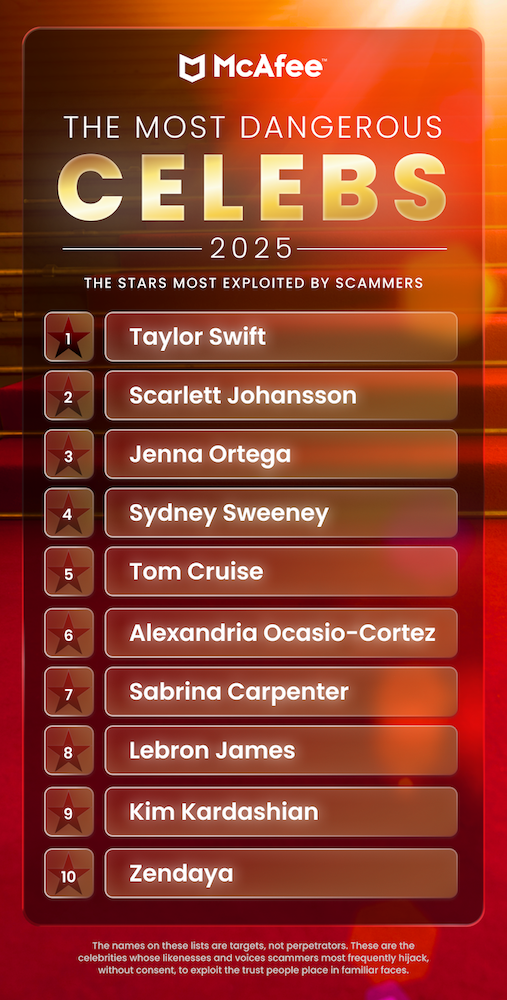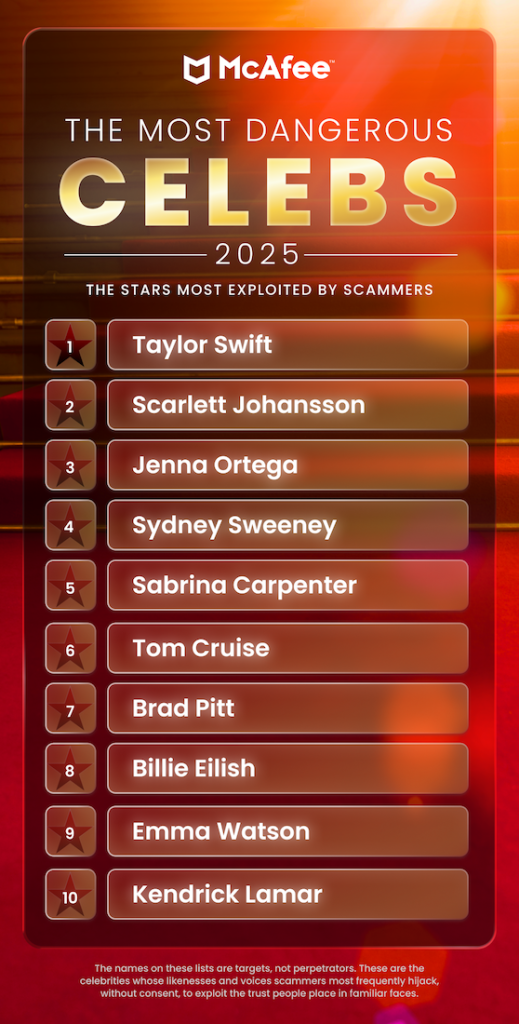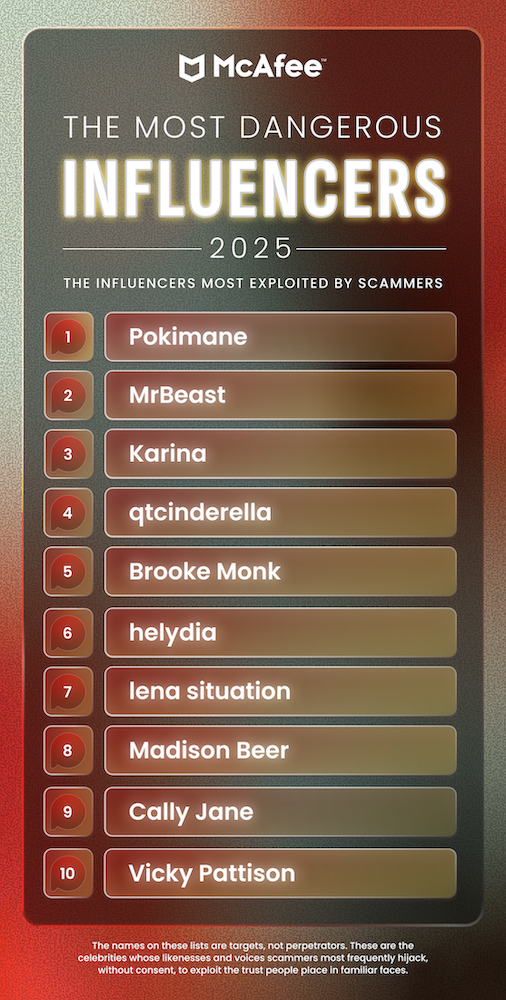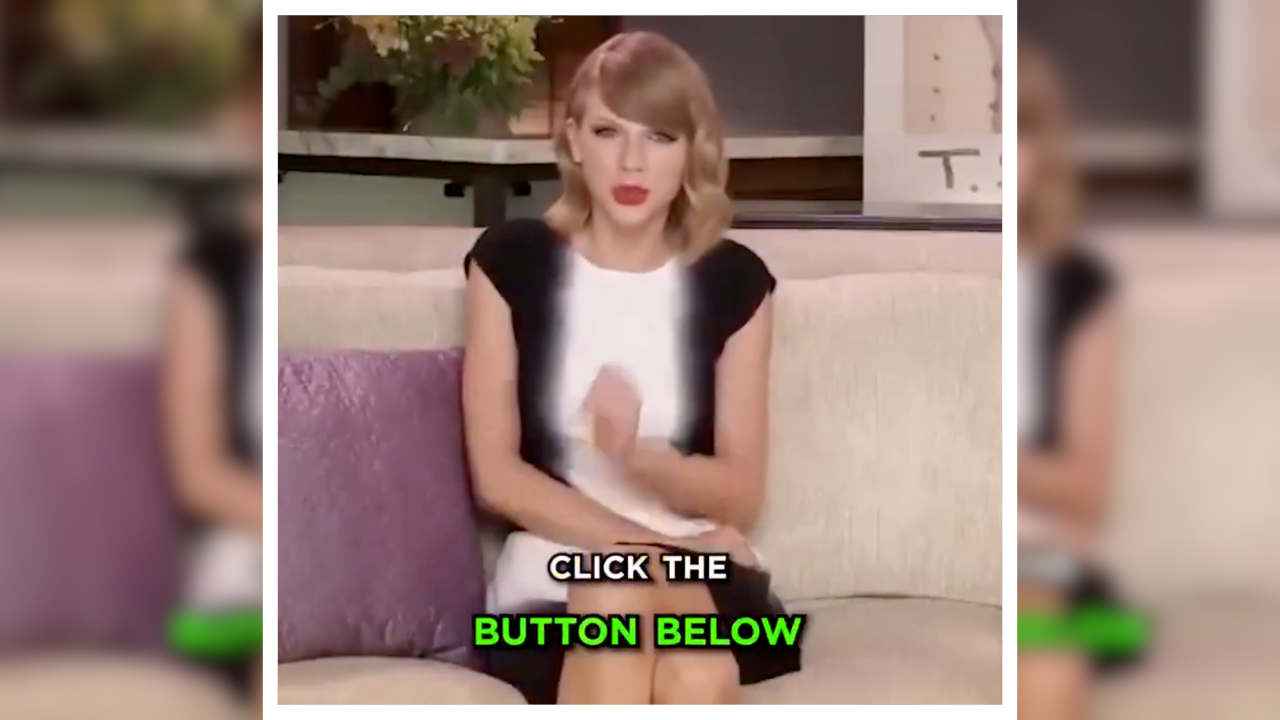You’ve seen the videos: a too-perfect Taylor Swift promoting free cookware. A fake Tom Hanks offering dental insurance.
They look real—but they’re not.
New research from McAfee Labs shows just how common these scams have become.
Our 2025 Most Dangerous Celebrity: Deepfake Deception List ranks the stars and influencers whose likenesses are most hijacked by scammers, and reveals a growing market for AI-powered fake endorsements.
At the top of the list? Taylor Swift, followed by Scarlett Johansson, Jenna Ortega, and Sydney Sweeney. Globally, names like Brad Pitt, Billie Eilish, and Emma Watson also appear among the most exploited.
McAfee also released its first-ever Influencer Deepfake Deception List, led by gamer and streamer Pokimane, showing that scammers are now targeting social platforms just as aggressively as Hollywood.
Top 10 Most Dangerous Celebrities (2025): U.S

Top 10 Most Dangerous Celebrities (2025): Global

Top 10 Most Dangerous Influencers (2025): Global

Why Scammers Love Famous Faces
The formula is simple: use someone people trust to sell something that doesn’t exist.
Criminals clone celebrity voices and faces with AI to promote fake giveaways, skincare products, crypto investments, or “exclusive” deals that lead straight to malware or payment fraud.
According to McAfee’s survey of 8,600 people worldwide:
- 72% of Americans have seen fake celebrity or influencer endorsements.
- 39% have clicked on one.
- 1 in 10 lost money or personal data, an average of $525 per victim.
Scammers exploit trust. When you see a familiar face, your brain automatically lowers its guard. And that’s exactly what they count on.
How Deepfakes Are Making Headlines
AI has made these scams look frighteningly real.
Modern deepfake generators can mimic voices, facial movements, and even micro-expressions with uncanny precision. Only 29% of people feel confident identifying a fake, and 21% admit to having low confidence spotting deepfakes.
That’s how fake endorsements and AI romance scams have exploded online.
- A woman in France lost nearly $900,000 to a scammer posing as Brad Pitt, complete with AI-generated images and voice messages.
- TV host Al Roker was recently targeted by a fake deepfake video claiming he’d suffered heart attacks.
- Tom Hanks, Oprah, and Scarlett Johansson have all been used in fraudulent ads for products they never touched.
“Seeing is believing” doesn’t apply anymore, and scammers know it.
The Psychology of The Scam
Deepfake scams don’t just rely on technology; they prey on parasocial relationships, the one-sided emotional bonds fans form with public figures.
When a “celebrity” DMs you, it doesn’t always feel strange. It feels personal. That sense of intimacy makes people act before thinking.
It’s the same psychological playbook behind romance scams, now supercharged by AI tools that make fake videos and voice messages sound heartbreakingly real.
How to Protect Yourself
- Pause before you click. If an ad or post seems out of character or “too good to be true,” it probably is.
- Verify at the source. Check the celebrity’s verified account on social media. Scammers often copy profile photos and bios but miss subtle details like posting style or engagement patterns.
- Look for signs of AI manipulation. Watch for off-sync lip movements, robotic tone, or lighting that looks inconsistent.
- Never share personal or payment details via messages, even if the sender appears to be verified.
- Use McAfee’s Scam Detector, included in all core plans, to automatically analyze texts, emails, and videos for signs of fraud or deepfake manipulation.
Key Takeaways
Celebrity and influencer culture has always shaped what we buy, but now it’s shaping how scammers deceive. These deepfakes don’t just steal money; they chip away at our trust in what we see, hear, and share online.
The celebrities at the center of these scams aren’t accomplices, they’re victims, too, as criminals hijack their likenesses to exploit the bond between fans and the people they admire. And as deepfake tools become easier to use, the line between real and fake is vanishing fast.
The next viral “giveaway” might not be an ad at all…it could be bait.
You can’t stop scammers from cloning famous faces, but you can stop them from fooling you. Use McAfee’s Scam Detector to scan links, messages, and videos before you click.













